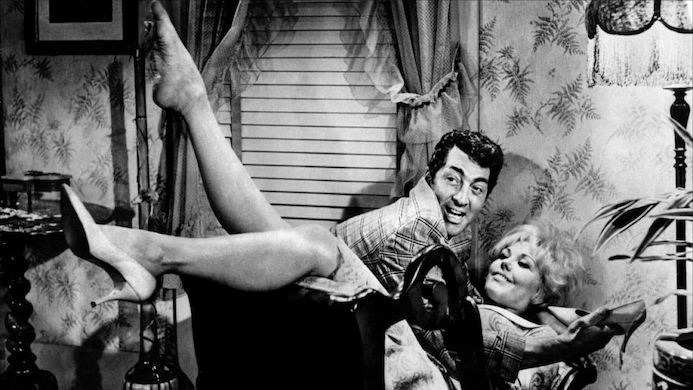Billy Wilder’s Sharp Wit and Jaundiced Eye on Full Display at Film Forum
The legendary director’s rare duds will be shown along with gems such as “Some Like It Hot,” “The Apartment,” and “The Fortune Cookie” during a three-week retrospective.

‘Written & Directed by Billy Wilder’
Film Forum
July 14-August 3
Unbeknownst to most of us, Billy Wilder and I.A.L. Diamond solved the mystery of the Loch Ness monster some 50 years ago. Nessie, you see, isn’t a plesiosaur that managed to survive extinction by going undercover just a short jaunt from Inverness. The mythical creature is, in point of fact, a British submarine designed by Mycroft Holmes sometime around 1887. Of course, disguising the submersible as a prehistoric beast was deemed the most efficient manner by which it could remain top secret.
Lest you think I’ve just spoiled “The Private Life of Sherlock Holmes” (1970), rest easy: The movie spoils itself well before the denouement. Wilder aficionados may want to take it in if only to marvel at how a great filmmaker could fall so flat. That the studio bigwigs strong-armed Wilder into cutting the film from its original length of almost three-and-a-half hours is true enough. Still, it’s not as if Wilder and the screenwriter Diamond had done anything remotely original or, for that matter, private with Arthur Conan Doyle’s legendary detective.
“The Private Life of Sherlock Holmes” is the rare dud being screened by Film Forum as part of “Written & Directed by Billy Wilder,” a three-week retrospective dedicated to “an attacker of the American dream and … a tasteless teller of dirty jokes.” That quote is culled from the blurb announcing the series. Would that the cineastes on Manhattan’s West Houston Street had cited its source: Is it at all an accurate description?
Someone could, I guess, point to the takedown of corporate expansionism in “One, Two, Three” (1961) or the exposé of media cynicism in “Ace in the Hole” (1951). Wilder’s ire was ecumenical in its reach. Having left his native Austria because of the antisemitism he experienced, not to mention the rise of National Socialism, Wilder can’t be faulted for casting a jaundiced eye on the doings of men. Fortunately, he was also blessed with a sharp wit, a gift that was likely encouraged by his Hollywood mentor, Ernst Lubitsch.
Wilder worked on the script for “Ninotchka” along with Walter Resich and Charles Brackett. Not only was it a hit for director Lubitsch, the film established Wilder as a force to be reckoned with. Wilder and Brackett had previously written the script for “Bluebeard’s Eighth Wife” (1938), another Lubitsch venture and an underrated gem. They also collaborated on two indispensable pictures, “Double Indemnity” (1944) and “Sunset Boulevard” (1950), and a run of impressive also-rans like “Five Graves to Cairo” (1943), “The Lost Weekend” (1945), and “A Foreign Affair” (1948).
Wilder and Brackett parted ways shortly after Norma Desmond proved ready for her close-up. Wilder worked with a variety of different partners on “Stalag 17” (1953), “The Seven Year Itch” (1955), and “Witness for the Prosecution” (1959). But it was with his next film, “Some Like It Hot” (1959), that Wilder teamed up with another ideal helpmeet, I.A.L. Diamond. Their subsequent collaborations on “The Apartment” (1960), “Irma La Douce” (1963), and “The Fortune Cookie” (1966) were remarkable efforts, helped immeasurably by actors like Jack Lemmon, Walter Matthau, Shirley McLaine, and James Cagney, whose performance in “One, Two, Three” is among the most hyperkinetic in cinema history.

But then there’s “Kiss Me, Stupid” (1964), a vehicle Wilder and Diamond had written with Marilyn Monroe in mind and that, upon Monroe’s death, starred Kim Novak. As a waitress and prostitute dubbed Polly the Pistol, Novak is dragooned by Orville J. Spooner (Ray Walston), a small town piano teacher and wanna-be songsmith, into an elaborate (and adulterous) ruse that is intended to convince Dean Martin to record one of Orville’s tunes. Actually, make that “Dino”: Martin stars as a cruelly delineated version of himself. Meta is forever.
“Kiss Me, Stupid” is some kind of train wreck, a sex comedy that doesn’t know if it’s a satire on crass social mores or just plain crass. The film occasioned a raft of criticism upon release, and its unstinting array of cheap jokes is unlikely to find sympathetic audiences today. Granted, the upshot of the movie is a vote, of sorts, for women’s empowerment, and Novak brings a surprising complexity to her role as a hotsy-totsy. The film isn’t easily recommended, yet it’s of a piece with the Wilder worldview whose parameters, mostly for the better, are on display in “Written & Directed by Billy Wilder.”

